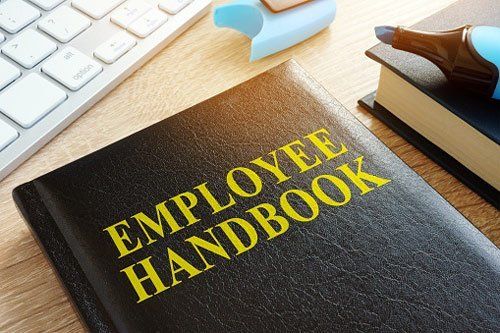ADDRESS: 3900 Newpark Mall Road 3rd Floor Newark, CA, 94560 | EMAIL: daniel@kisnerlaw.com
CALL US FOR A CONSULTATION
(510) 791-5790
Get Organized for the Future With a Good Employee Handbook

As your business grows, written communication with your employees becomes more and more important. It protects your business, boosts employees' satisfaction, and prevents misunderstandings.
One of the biggest employer–employee communications is the employee manual. Unfortunately, many businesses don't even have an employee manual or handbook to begin with. If you think it may be time for your company to produce one, what should you include? Here are five key things.
Legally Required Notices
Start your employee manual with items that you're legally required to notify your employees. This will vary from state to state, but federal law generally requires a statement about your nondiscrimination policies, workers' compensation information, and if your company is subject to FMLA (Family and Medical Leave Act).
Check with your state's Labor Department for more items required by state law. A business attorney is also your best resource to ensure that all legally required notices are included in the manual.
Time Off and Pay
Employees are often interested in two major aspects of working for a company: time off and pay. Specify your time off policy in the manual so everyone understands how it works and that it's fair and equal for all employees.
Include information about waiting periods for benefits, how vacation and sick time are accumulated, what is the procedure for using said time off, and what will be available upon termination. If you offer compensatory time, how does it work? And what discretion do managers or Human Resources have?
Hiring and Termination Information
Your manual will be the orientation for new employees in the future, so include specifics for them. This should be things like probationary periods, benefits information and vetting periods, and company information (both practical and historical). And outline the procedure for managing disputes or concerns.
On the other end of the employee spectrum are separations. What is the disciplinary process, and how may it lead to termination? How much notice is required, if any, and how will final pay be handled? What equipment must be returned upon termination? And how are future work references handled? Remember, the more clear you are about the process of joining and leaving your company, the fewer unfulfilled expectations everyone will suffer.
Employee Behavior
As a manager and owner, you have expectations about how your employees will conduct themselves — sometimes both during and outside of work hours. The manual should codify these expectations in writing in the Company Code of Conduct.
A code of conduct should specify things like how you'd like employees to dress at work, what ethical requirements you expect them to maintain, and any safety issues. What is your attendance, late, and call-in policy? Put it here. Depending on your business or industry, you may also want to be specific about social media use by employees, political activity on the job, and discrimination.
Disclaimers
No matter how much work goes into it at a given time, an employee handbook is a living document. This means that it's subject to change — and it will change as your business grows, retracts, changes, and faces new challenges or opportunities. So be sure that you state in your manual that items are updated and may be revised.
In addition, add wording that clarifies that the handbook is not a binding contract but that it does replace earlier company documents that may have addressed the same subjects. Finally, include a signature page so that people can acknowledge that they have read the manual.
Are you ready to get started on your new employee handbook today? Begin with a consultation with the experienced business attorneys at Kisner Law Firm today. We can help you through the process of creating a document that helps your business grow and your employees shine.
PHONE: (510) 791-5790 | EMAIL: daniel@kisnerlaw.com
ADDRESS: 3900 Newpark Mall Road 3rd FloorNewark, CA, 94560
HOURS OF OPERATION:
- Mon - Fri
- -
- Sat - Sun
- Closed










